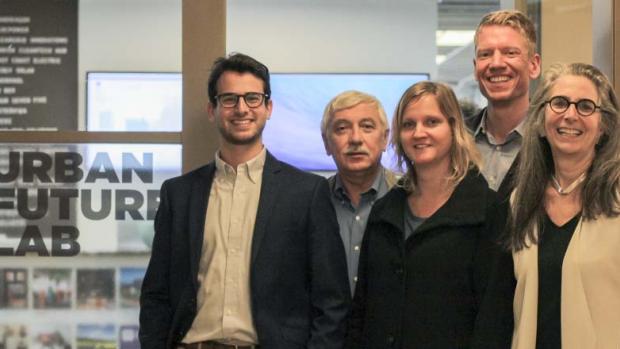A Cross-Border CleanTech Conference

On November 3, a conference was held at the Consulate General of the Federal Republic of Germany focusing on clean, sustainable energy. The event celebrated the strides being made in both that country and right here in New York City and explored the collaborative possibilities open to academic researchers, start-ups, established companies, and others interested in the field.
Among the speakers were luminaries from organizations like the Berlin Energy Agency and the German-American Chamber of Commerce (GACC) — and the NYU Tandon School of Engineering, which co-sponsored the event.
Kurt Becker, Tandon’s Vice Dean for Research, Innovation and Entrepreneurship, helped open the proceedings. Becker had been instrumental in the 2014 signing of a Letter of Intent (LOI) to collaborate on clean energy technologies and innovation between the School of Engineering, the GACC, the Borough of Brooklyn, the Berlin Cleantech Business Park and Innovation Center, and the Berlin Senate Department for Economic Affairs, Technology and Research, and the moderator fittingly introduced him as “the engine that powers CleanTech at NYU.”
Becker delighted audience members by invoking Götterdämmerung (or Twilight of the Gods), the last piece in Richard Wagner's famed Ring cycle. “I think of the signing of that letter on September 3, 2014 as being like the ending of the opera’s prelude and the start of something big and important,” he explained. “Berlin and Brooklyn have since then been perfect partners, working together on clean energy solutions and hopefully ensuring that our world doesn’t end like the one in the opera.”
Giving a keynote address was Pat Sapinsley, the managing director of Tandon’s Urban Future Lab, who praised Germany’s own efforts and asserted that they were an inspiration to her. Sapinsley described Tandon’s participation in the proof-of-concept center known as PowerBridgeNY; the Clean Start program, aimed at allowing professionals in other fields to explore careers in the green economy; ACRE, Tandon’s cleantech, smart grid and sustainable, smart cities incubator; and such highly successful incubator companies as United Wind and Agrilyst.
Tandon is committed, she asserted, because there is no better way for an engineering student to put technology in service to society than by working in clean energy.
Kurt Becker returned for a panel discussion on what it takes to be a participant in the field and explained that it occasionally takes patience. Sometimes those who fund new ventures demand quick results and high returns, he said, and often, the process of scientific discovery does not follow that trajectory.
Success also means being ready to leverage an opportunity. “Back in 2009, when the New York City Economic Development Corporation was providing seed funding for technology-based initiatives, we knew that science and engineering breakthroughs were the starting point,” he recalled. “We stepped up and raised our hand, and that was the start of ACRE.”




